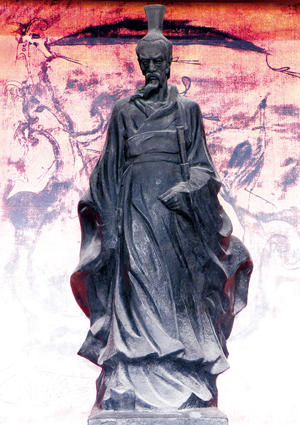Written by: Yao Dan
Posted on: July 16, 2013 |  | 中文
| 中文
Qu Yuan- lament on encountering sorrows
In terms of literary genre, no established names were given to Qu Yuan's works in general at the time when he wrote them. By the time of the Western Han Dynasty, Qu Yuan's works, as well as those of his followers, were given the standard name of "Elegies of the State of Chu," first by Sima Qian and then by Liu Xiang. First taking shape during the Warring States Period when prose was at its zenith and was greatly influenced by the free, bold and unrestrained style of writing prevalent at that time, elegies of Chu broke through the bounds of brevity and repetitiveness established previously by The Book of Songs. The elegies of Chu, flooded with close questioning or retrospection, were marked by the diversity of sentence patterns and tension between the lines. Accordingly, they often appeared to be more magnificent and spectacular in scale. The character "xi"("?") was a common word in The Book of Songs and most of the lines observed the same "four-character" sentence structure. But the sentence structures in the elegies of Chu were diversified and more flexible, with some lines containing five or more characters each. Poets of the elegies of Chu were not willing to stick fast to the form of the four-character line, but other forms of writing had not yet taken shape. Subsequently, the character "xi" was used by these poets for rhythm's sake. The most frequently used rhythm in the elegies of Chu was "three-character + three-character + xi, three-character + three-character," which can be exemplified by the following line: "Heaving a sigh prolonged and wiping off my tears, / I grieve the life of our people with thorns and hardships laid."
 |
| Bronze Statue of Qu Yuan in the Qu Yuan Temple |
Qu Yuan is a prolific poet. The Lament on Encountering Sorrows (also known as Li Sao) is the most important piece of all his works, as well as one of the masterpiece poems in Chinese literature. It is a long lyric poem and comprises 372 lines. Literally, "Li" means "suffering or undergoing or encountering" and "Sao" means "sorrows or throes." So "Li Sao" can be rendered into The Lament on Encountering Sorrows. The poem The Lament on Encountering Sorrows gives a vivid portrayal of the speaker, a man of noble origin with a pure and noble character, who expresses his pent-up feelings. The first line of the poem is "A scion far of Emperor Gaoyang I am." Emperor Gaoyang was the grandson of Huangdi, the common ancestor of all the Chinese people. From this we can see the nobility of the blood lineage of the poet or the speaker "I." "At morn, I drink the magnolia's dripping dews, / At nightfall, I on asters' fallen petals dine." What the poet drinks and has for food are dew from the magnolia and the fallen petals of asters, both of which are symbols of nobility and purity. But the age the poet belongs to is one in which "I see those junta men all take to pleasures ill, /Their paths are dark and hazardous in butt," and "The rabble, greedy for gains and power, rushes on, / Chock-full, yet still not content with what it has got; / Each of them, self-condoning and doubting others, / Becomes' bristling with envy rancid and hot," and the common practice of these men is "Truly to craft alone their praise they pay, / The square in measuring they disobey; /The use of common rules they hold debased; / With confidence their crooked lines they trace." In these lines, "those junta men" and "the rabble" refer to the aristocrats and their offspring who are in power and are shamelessly greedy. When referring to the folks at the lower strata of society, who have neither power nor position, the poet uses the word "people." The line "Heaving a sigh prolonged and wiping off my tears, / I grieve the life of our people with thorns and hardships laid - one of the most famous lines in Qu Yuan's poems - voices the poet's deep grief and concern for the national crisis of the State of Chu and the disastrous situation of the common people.
In The Lament on Encountering Sorrows, Qu Yuan gives some thought on several roads that he might possibly take and his deliberation on the various roads is manifested in the form of a discourse between several persons. His elder sister exhorted him tirelessly: since his concern for his country and people would not be appreciated, why should he continue like this to ask for a snub and hold himself aloof with a stubborn will, only to get rejected in the end by others? But Qu Yuan was bent on his own will and forged straight ahead. "Bending my nature just and restraining my will, / I chew the cud of blame and the disgrace gulp down." He would know no regret at all even if he "stands on spotlessness and dies an upright death." During his exile, he asked a witch to show him his future. The witch, trying to persuade him to leave his native country, said, "What place is there where orchids flower not fair? / Why is thy native land thy single care?" But Qu Yuan, as a noble of the State of Chu and conscience of the great honor of his family name, one of the three distinguished family names in Chu, could not bear to leave. The lines "My way lies remote and so far, far away; / I shall go up and down to make my long search," were the standards he set for himself at the time; but the end of the long way, as it turned out later, was death.
Qu Yuan's poems were beautifully written. In addition, he was also the first poet who likened aromatic herbs and autumnal eupatorium to his own and others’ personalities, and used plants to symbolize people's character and moral integrity. On the other hand, the cardinal properties of the elegies of Chu were also unyielding, forceful and vigorous. These cardinal properties were grounded on the poet's concern for his country and people, and supported by his upright character and perseverance in pursuit of truth. In the opening lines of The Lament on Encountering Sorrows, the poet's image appears before our eyes as a man of passion, wearing aromatic herbs on the shoulders and autumnal eupatorium as pendant: "Endued thus with selineas and angelicas, / I wear as pendant ruffle eupatorium autumnal." Qu Yuan once held the official post of the "Lord of the Three (Family Lane) Portals," taking charge of the family affairs of the three royal families, Zhao, Qu and Jing, and at the same time being responsible for the education of the children from these three families. He wrote in The Lament on Encountering Sorrows:
 |
| Qu Yuan temple in Lepingli (Qu Yuan's birthplace) |
I've planted nine fields of eupatorium sweet, / And raised a hundred mu of fragrant coumarous, / Together with fifty acres of azalea bright, / And asarums and angelicas fresh and new. / Expecting sore their foliage would then flourish fast, / I wish I could in due time reap an odorous crop.
Here, Qu Yuan portrayed the image of himself as a gardener. He planted sweet flowers and beautiful grasses like fragrant coumarous and likened the children from the three royal families to asarums and angelicas. Placing great hopes on them, he expected they would be able to display their talent and do well in life when they grew up. But, as it turned out later, Qu Yuan lost all hope in them:
Eupatory and angelica spread sweets naught, / Acorus and coumarou have changed into reeds. / Why is the odorous herbage of yesterdays / Turned directly into artemisias today?
For this reason, Qu Yuan said, "I do grieve the scentful herbage rot and drop!"
Images of beauties also appeared frequently in Qu Yuan's poems and most of them were used metaphorically. However, interpretations of these images have been different throughout the ages. Some held that Qu Yuan likened the beauty to himself and the monarch to the image of husband, with the relationship between the monarch and the minister similar to that of husband and wife; others held that sometimes the beauty referred to Qu Yuan himself and sometimes to the King of Chu:
As days and months away do haste without a pause, / So spring and autumn alternate by turns always; / Reflecting on the trees and herbage falling sear, / I fear the Beauteous One would grow old too someday.
Comparing himself to the "Beauteous One" whose charms would soon fade, Qu Yuan was seized with anxiety that the King of Chu would no longer have any use for him. If viewed from the perspective of likening the "Beauteous One" to the king of Chu, Qu Yuan was worried that the king of Chu would accomplish nothing before he got old.
Qu Yuan's elegies of Chu and The Book of Songs differ both in form and poetic thought. Poems in The Book of Songs are imbued with primitiveness and naivety, while Qu Yuan's poems are intense and passionate, heterogeneous in content and "more visionary in thought and more ornate in language." The style of The Book of Songs is "mild and sincere," whereas Qu Yuan's verse "comes directly from his heart and abides by no established rules (An Outline History of Chinese Literature, by Lu Xun)”. This is why those who hold The Book of Songs as the orthodox source of Chinese poetry are often inclined to hurl criticism at elegies of Chu. However, the influence the elegies of Chu have had upon Chinese literature is in fact greater than that of The Book of Songs. Qu Yuan lived in the Warring State Period, which saw the extensive flourishing of prose. The language of Qu Yuan's poetry received the baptism of prose writing, but he made more efforts towards writing in verse. Practically every line of Qu Yuan's poems was rhymed and antitheses were widely used as well, which mapped out the basics for later Chinese poetry. The four-character line with a two-character rhythm is the most prominent feature of almost all the poems in The Book of Songs. Qu Yuan's elegies of Chu initiated the form of three-character rhythm in poetry writing, which opened the road of the three-character rhythm for the five-and seven-character poems and exerted an influence of more than a thousand years upon Chinese poetry. Qu Yuan's poems are either "lucid, beautiful, and sorrowful," "elaborate and melancholy," "gorgeous and exotic, and resourceful," or "dazzling and full of inner beauty." This is why Elegies of the State of Chu surpasses the past and contemporary works in both spirit and excellence of language. Its brilliance and exquisite beauty are insurmountable (Liu Xie: "Evaluating The Elegies of the State of Chu," Dragon-carving and the Literary Mind).”
The romanticism in elegies of Chu can find its origin in Zhuangzi. Zhuangzi, however, maintaining that "people were lost to the pleasures of the material wealth and could not be argued with or reasoned with," landed himself in nihilism. Contrary to Zhuangzi, Qu Yuan, though frustrated, persevered in the pursuit of truth and even gave his own life for his lofty ideals. Qu Yuan wrote his works with his life, his passion and his literary grace, and his poems "have their own lofty style." Chinese poets from the later centuries, like Li Bai and Su Shi, were actually the foremost followers of Qu Yuan.
You may also like: